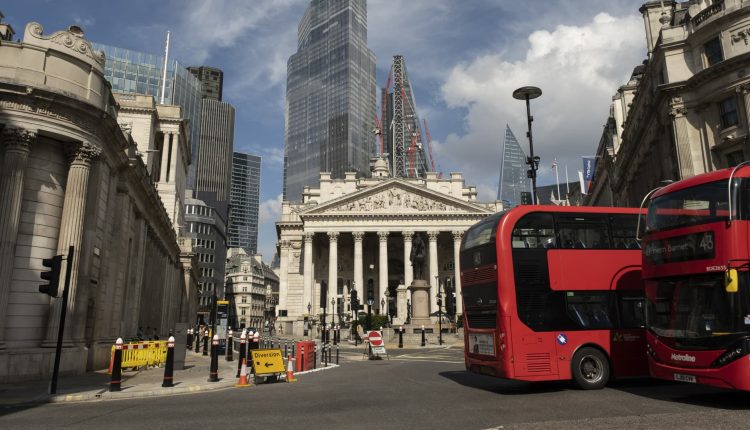Buses pass in the City of London financial district outside the Royal Exchange near the Bank of England on 2nd July 2021 in London, United Kingdom.
Mike Kemp | In Pictures | Getty Images
LONDON — The Bank of England on Thursday kept its main interest rate unchanged at 5.25% and said monetary policy is “likely to need to be restrictive for an extended period of time.”
The Monetary Policy Committee voted 6-3 in favor of holding rates steady for a third consecutive meeting. The three dissenting members favored a further 25 basis point hike to 5.5%.
U.K. headline inflation fell to an annual 4.6% in October, its lowest point in two years, while wage growth has also undershot expectations of late but remains uncomfortably high for the central bank, as it looks to bring inflation down towards its 2% target sustainably.
The MPC noted in Thursday’s report that “key indicators of U.K. inflation persistence remain elevated,” although tighter monetary policy is leading to a looser labor market and weighing on activity in the real economy.
Real U.K. GDP was flat in the third quarter, in line with the Monetary Policy Committee’s projections, but the economy unexpectedly shrank by 0.3% month-on-month in October.
The central bank ended a run of 14 straight hikes in September, after lifting its benchmark rate from 0.1% to a 15-year high of 5.25% between December 2021 and August 2023.
The U.S. Federal Reserve on Wednesday revealed that policymakers were penciling in at least three interest rate cuts in 2024, offering a dovish surprise that sent global stock markets surging.
However, the MPC once again pushed back against market expectations, reiterating that rates will need to stay in restrictive territory for an extended period of time in order to return inflation to target over the medium term.
“As illustrated by the November Monetary Policy Report projections, the Committee continues to judge that monetary policy is likely to need to be restrictive for an extended period of time,” the MPC said.
“Further tightening in monetary policy would be required if there were evidence of more persistent inflationary pressures.”
The Bank last week warned that although household finances are faring better than expected, higher borrowing costs have yet to fully feed through to the economy.
Suren Thiru, economics director at ICAEW, said the Thursday decision was further confirmation that interest rates have peaked, but suggested that the Bank was at risk of keeping monetary policy too tight for too long, given the fragile economic backdrop.
“The Bank’s rhetoric on rates is unnecessarily hawkish given slowing wage growth and a deteriorating economy, raising fears that it will keep rates high for too long, unnecessarily damaging an already struggling economy,” Thiru said.
“With inflation trending downwards and the economy at risk of recession, the case for interest rate cuts is likely to grow over the coming months. Against this backdrop, the Monetary Policy Committee could well start loosening policy by next summer.”
Read the full article here

